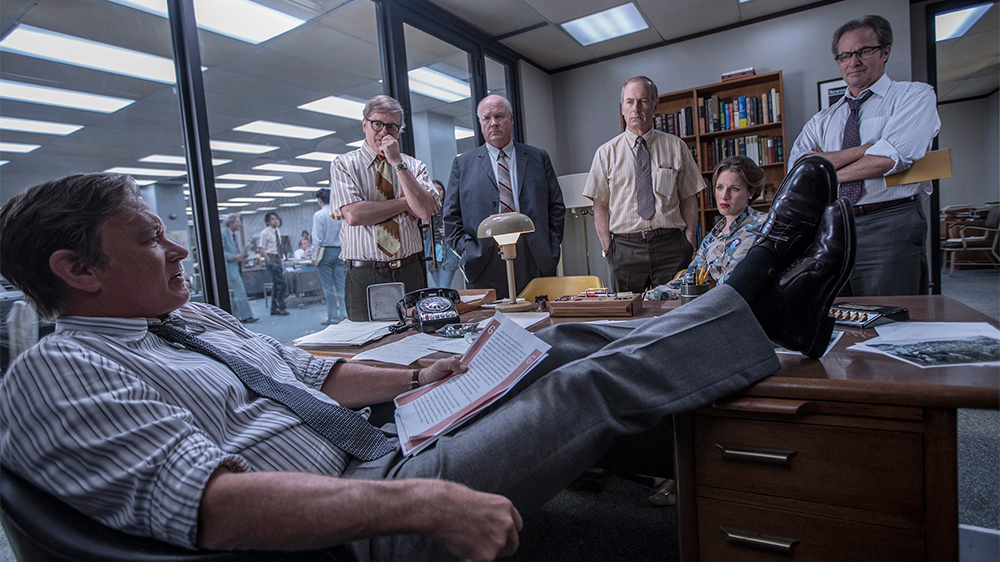Spielberg's The Post: A Cliché Fest From When Reporters Weren't Celebrities And Facts Mattered
Watching the film All The Presidents Men back in 1975 made me want to be a reporter. Seeing Richard Nixon hoisted by his own petard— and a couple of unheralded reporters— was thrilling.
The excitement, the danger and the purpose of rooting out important stories in the manner of Bob Woodward and Carl Bernstein seemed a prescription for a life well spent. They made the dedication to the tedious process of getting it right sexy. I know that many of the peers I later worked with felt the same way.
Imagine, if we played our cards straight, we might have Robert Redford play us in a film!
I was reminded of that that youthful idealism as I watched Steve Spielberg’s clunky The Post, a retelling of another seminal 1970s U.S. journalistic moment, the Pentagon Papers. For those not north of 50, the Pentagon Papers story was the clandestine release of top-secret files on the Viet Nam war to the New York Times and Washington Post by a dissident military analyst named Daniel Ellsberg.
Ellsberg had access to the files via his position at the Rand Corporation, which was storing the report on America’s cynical pursuit of a Viet Nam strategy from the Truman years to Richard Lyndon Johnson’s time in the White House. He leaked them to the Times and, later, the Washington Post. The movie centres on the decision of Post publisher Katherine Graham to publish the documents in the face of possible charges under the Espionage Act from the U.S. government.
This is done in the face of considerable political and social pressure from the Nixon government (which was ironically winding up the war JFK and LBJ started) and Graham’s friends such as Robert McNamara, one of the major architects of the Viet Nam strategy. There was also the business pressure of attacking the government at the same time as the Post went public on the NYSE.
It’s a great story, which Spielberg then lards with movie-making clichés, retrospective liberal symbology and a cast of leftist icons like Meryl Streep and Tom Hanks— now inextricably associated in the anti- Donald Trump movement. The movie ends with the 1972 Watergate break-in that precipitated the demise of Nixon and a constitutional crisis.
This is Spielberg spiking the liberal ball, prefiguring the high point in progressive self-regard— a media self-love affair that underpins the current Trump resistance. It ends with the Post vindicated. (Ironically, many of the liberals cheering the publication of the Pentagon Papers in the theatres are the same people now decrying the Republicans efforts to publish files of possible FBI malfeasance.)
It was heady stuff at the time, of course. And while Spielberg certainly doesn’t note it, the Pentagon Papers and its follow-on Watergate investigation were also a pivot point for the American press. It introduced celebrity journalism— a strain of idealism and an unseemly appetite for getting your name above the title.
Until the time of the Pentagon Papers reporting was the purview of lifers who were largely unknown— and liked it that way. There were opinions, of course, but they were tucked deep inside the paper, not on A1. With no 24-hour news cycle, stories could be released when they were ready, not rushed to beat some geek on Twitter. As The Post also demonstrates, it was also riven with conflicts between reporters and the people they covered.
The PP story and the subsequent Watergate broke that template. In its place the reporting process was infected with zealots who see the fourth estate as a sacred political mission, not an exercise in revealing facts. The unholy melding of opinion with facts in stories has created a celebrity hybrid reading more like a campaign platform than an honest recitation of fact.
In place of seeking out stories, many outlets bring their stories with them. Climate issues, immigration, pay equity, gender reassignment and global governance have replaced the five Ws (who/ what/ where/ when/ why) as the keystones of journalism. (Conservative media is not much better, littered with Sean Hannitys and Bill O’Reillys who couldn’t report a story straight if you asked them.)
As a result we are now wallowing in virtue exercising on all sides masquerading as journalism. The facts are secondary to narratives. This pack journalism is inspired, ironically, by the noble calling of All The Presidents Men, where the old ways of reporting— chasing facts, interviewing the guilty and burying oneself in the documents— got the story right.
Don’t expect Spielberg to take a movie of that, however.
Bruce Dowbiggin @dowbboy.is the host of the podcast The Full Count with Bruce Dowbiggin on anticanetwork.com. He’s also a regular contributor three-times-a-week to Sirius XM Canada Talks Ch. 167. A two-time winner of the Gemini Award as Canada's top television sports broadcaster, he is also the best-selling author of seven books. His website is Not The Public Broadcaster (http://www.notthepublicbroadcaster.com)

